A Poker Life -- Nick SchulmanFrom Pool to Poker |
|
|
A Poker Life is a new series for CardPlayer.com that looks beyond the felt and into the untold stories of poker’s biggest names.
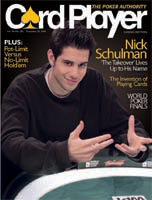 In November of 2005, Nick Schulman found himself at a televised World Poker Tour final table sitting across from consummate professionals, including Allen Cunningham, Bill Gazes, and Lyle Berman, in his second $10,000 buy-in tournament ever. He’d already outlasted most of the 783-player field, but he’d have to defeat five more to win the nearly $2.2 million first-place prize.
In November of 2005, Nick Schulman found himself at a televised World Poker Tour final table sitting across from consummate professionals, including Allen Cunningham, Bill Gazes, and Lyle Berman, in his second $10,000 buy-in tournament ever. He’d already outlasted most of the 783-player field, but he’d have to defeat five more to win the nearly $2.2 million first-place prize.
Equipped with the chip lead entering six-handed play, Schulman methodically flexed his aggression muscle, calmly accumulating his opponents’ chips and eliminating all but one player at the table. His presence was controlled, emanating professionalism beyond his years, and without ever relinquishing his lead, Schulman became one of the very first poster-children of hyper-aggressive young players. At 21 years and two months old, Schulman became the youngest WPT winner, a record that has yet to be broken.
Images of a happy, carefree looking Schulman graced the cover of Card Player magazines across the country, shoving him into the poker spotlight. If a picture is worth a thousand words, most would say that Schulman had his life in order with the world at his fingertips, and was living a dream life, but in truth, that wasn’t always the case.
Close Call
Born in New York City, Schulman grew up with his parents and older brother and sister. He describes his growing up quite normal, getting good grades from elementary through middle school, but things started to change his freshman year in high school. Schulman began dealing with anxiety issues.
“I would feel like I was hyperventilating, and I’d get very dizzy and be very scared. I went to the doctor and emergency room a few times, but I didn’t know what was happening and neither did my parents, so I didn’t do anything about it,” remembers Schulman.
Schulman’s panic attacks become more and more frequent, with most of them occurring during school. Perhaps a combination of an increasing fight with anxiety and negative external influences, Schulman began skipping class with his friends to hang out and smoke in a pool hall down the street from his school.
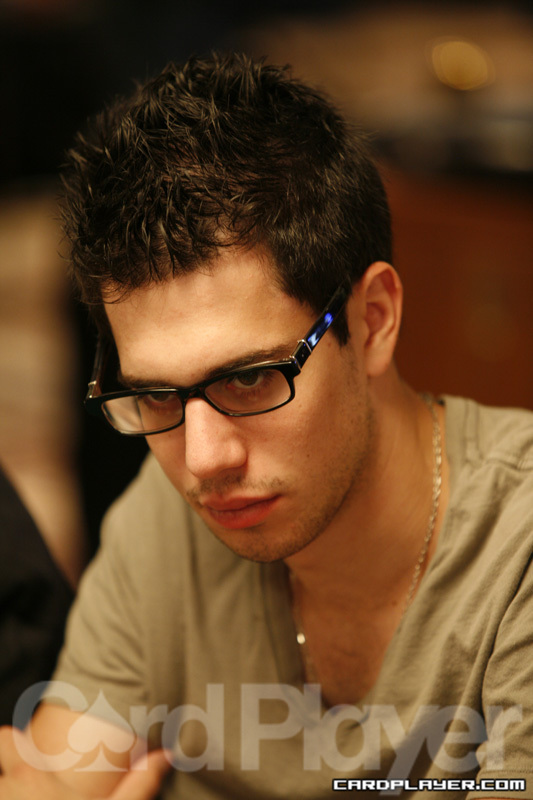
“One day, I stopped going to school, and all of a sudden a week turned into a month, and then sixth months. The anxiety was just less not being in a social setting and not being confined. I just immersed myself in pool.”
Schulman spent hours each day studying the angles on a pool table rather than those in a geometry book, and instead of vying for first-chair for his instrument of choice, the trumpet, he was competing for something else — money.
“The subculture of pool is very gambling oriented. At 13, I started playing for 10 or 20 bucks. By the time I was 16 or 17, I’d be looking to play people for $500 or $1,000, which, in pool, is very big.”
Traveling around Brooklyn and Queens, Schulman continued hustling pool and spending time in places that teenagers typically shouldn’t be. On more than one occasion, Schulman was robbed of the money he’d earned during a pool session, once by knifepoint. For three years, he woke up and played pool, averaging eight hours a day.
During this time, Schulman continued to suffer from anxiety, and after one attack, a doctor recommended that he see a psychiatr ist.
ist.
“We didn’t have very much money, so I went to a free research trial, and I met a guy who pretty much saved my life. He saw me outside of the hospital for free and explained to me what was going on. He’s been helping me ever since.”
With his panic attacks under control, Schulman moved out of his parents’ house at age 16 to live with another pool player.
Pool to Poker
In New York, poker and pool seemed to go hand in hand, and Schulman got his introduction to the game after a pool tournament he’d entered. At age 17, he jumped into a few $100 buy-in single-table sit-and-gos, but didn’t find much luck. He continued to play poker in the back of pool halls, and eventually learned the ins and outs.
“I know it sounds kind of cliché, but I knew that it was something that I wanted to pursue.”
Schulman became quite successful playing poker, but the lack of a high school diploma still nagg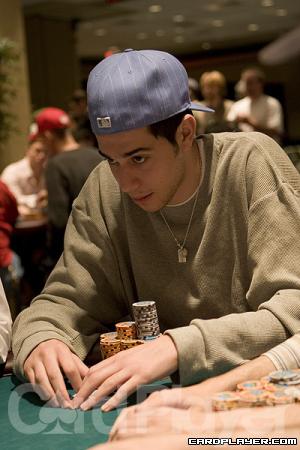 ed him. Eventually, he took the test to get his GED and passed it easily. He then grappled with the decision of whether or not to go to college. In the end, he chose to give poker a shot.
ed him. Eventually, he took the test to get his GED and passed it easily. He then grappled with the decision of whether or not to go to college. In the end, he chose to give poker a shot.
Schulman honed his game playing online at Paradise Poker and in live games, playing for stakes anywhere from $5-$10 to the occasional $100-$200, despite being severely under-bankrolled for such a game.
“Man, I would have played anything. I was a really crazy kid,” Schulman said with a friendly smile.
Just as he had immersed himself in pool, he did the same with poker. He spent countless hours putting in the work and carefully analyzing each session. Pool was slowly phased out of Schulman’s life, both because it became increasingly hard to find opponents who would play him for money, and because he came to the bittersweet realization that he’d never be amongst the very best competitors in pool.
“It was hard because I felt like my heart was still in pool, but it’s hard to make a living in pool unless you are in the top five or 10 players in the world. I just knew that I didn’t want to devote my life to something I couldn’t be great at.”
With pool on the backburner, Schulman’s poker game continued to improve, but he found it hard to tame his reckless “n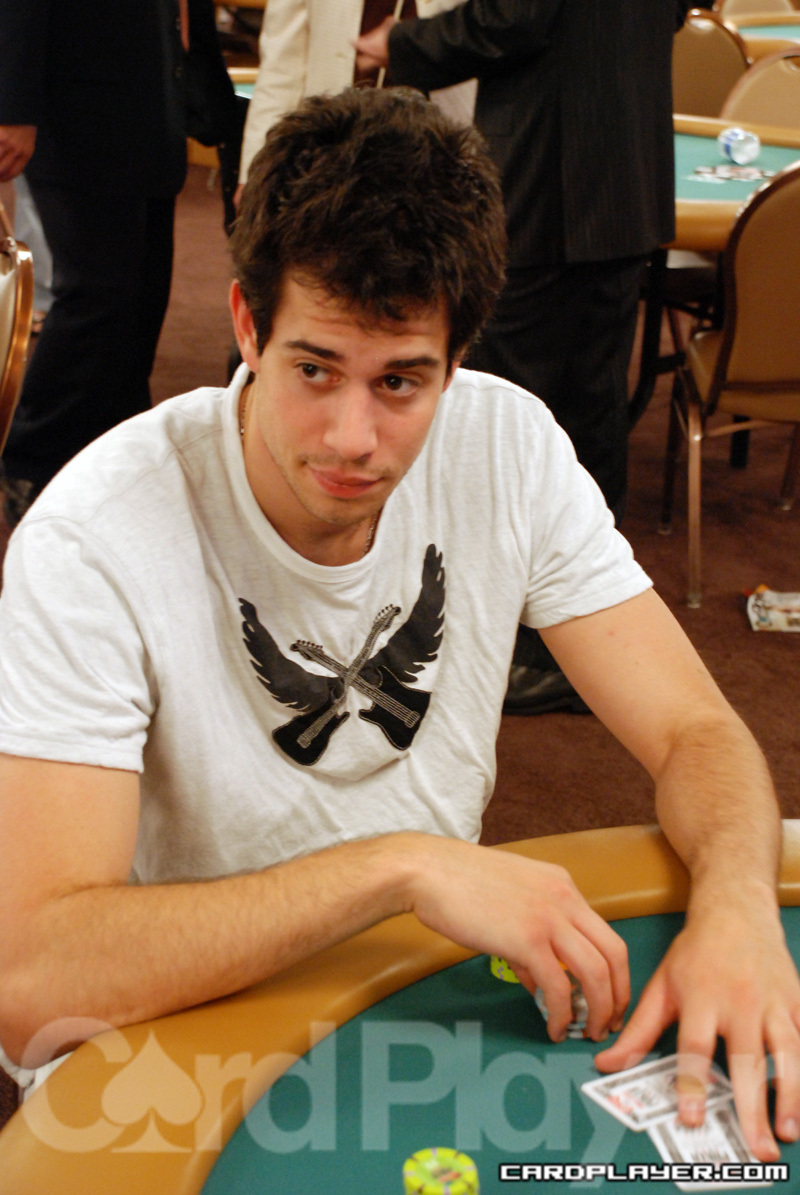 othing to lose” attitude. Occasionally, he’d have his entire bankroll on the table, so it wasn’t a surprise that he began taking shots at $10,000 tournaments when he turned 21.
othing to lose” attitude. Occasionally, he’d have his entire bankroll on the table, so it wasn’t a surprise that he began taking shots at $10,000 tournaments when he turned 21.
In his second major live tournament ever, Schulman snagged a WPT title at the World Poker Finals in Foxwoods. With his family and friends there to watch, Schulman became a multi-millionaire.
The Aftermath
A young, wealthy, attractive guy riding on the coattails of his latest success, Schulman admits that he let the win go to his head.
“I let my ego turn me into a person that I didn’t want to be. I wasn’t disrespectful to other people, but I just had an unrealistic view of myself.”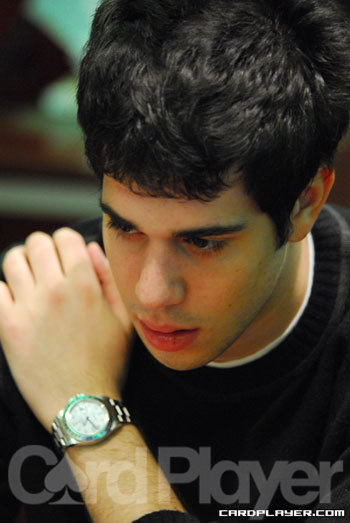
Schulman said that during the six months after the win, he spent too much money, played too high, and gambled too much, and realizes now that winning one tournament doesn’t mean that much in the grand scheme of things.
“I think it got to a point where I no longer respected myself as a person, and the choices I was making. I was living a lifestyle fueled by ego, and I was losing sight of the constant daily grind it takes to compete at an elite level in poker. I thought it would continue to come easily to me, and when I was woke up to the fact that it wouldn't, I became a much harder worker and much more humble.”
With fortune in the poker industry, fame usually follows, and with fame comes lack of privacy and high expectations, which brought back the anxiety that he’d battled for years.
“Just the idea of someone knowing me and me not knowing them bothered me,” said Schulman. “It was a lot of pressure, and I felt like I had a lot to prove myself. People started to talk, saying maybe I wasn’t that good.”
Over-confidence mixed with tournament variance led to a cold 2006 during, which he cashed for only a mere $38,000 in live tournaments. Just when onlookers may have discounted Schulman and began considering him a one-hit wonder, he mad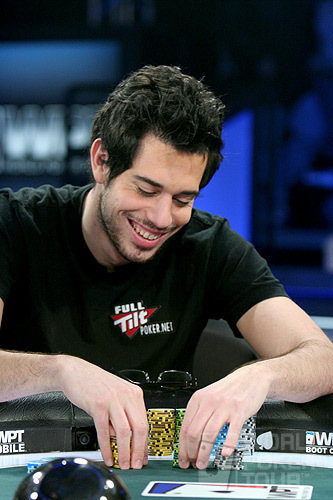 e another WPT final table in 2007, once again at the World Poker Finals at Foxwoods.
e another WPT final table in 2007, once again at the World Poker Finals at Foxwoods.
“At the time, I was devastated. I felt like I had a shot to make history, and instead I was just the first loser. As time has gone by, though, I'm proud of the accomplishment, but of course, nothing's as sweet as the win.”
Schulman finished as runner-up, a score worth $865,000. To date, Schulman has accumulated more than $3.5 million in lifetime winnings.
In addition to success in live tournaments Schulman continues profiting in high-stakes cash games. In New York, he regularly plays a $100-$200 no-limit hold’em home game. Online, Schulman can be found playing $500-$1,000 or $1,000-$2,000 H.O.R.S.E., as well as $25-$50 or $50-$100 heads-up no-limit hold’em on Full Tilt. Though cash games provide a steady income, much of his focus is still on accumulating more titles.
“I really want to win some tournaments. I feel like I’ve really been on the cusp for the last two years. I’ve gotten down there, and a few really big hands haven’t gone my way. I want to get back to final tables and I really want to win another major tournament. That’s really my goal right now.”
Picture This

He said that his anxiety issues aren’t completely behind him, but that he’s learned to live with it. Currently residing in New York with his girlfriend, Schulman says he’s in much better place than he once was.
“I feel pretty lucky, because I was really a mess. I know that there are a lot of undiagnosed disorders and undiagnosed depression out there, and that’s really sad. I was fortunate.”
At only 24-years-of-age, Schulman’s repertoire of life experiences is impressive. He’s overcome internal trials, survived days as an under-aged hustler, became a millionaire, and outgrew a short-lived egotistical attitude toward poker. It’s no doubt that his instinctual talent at the table will take him even further in poker, but it’s his unique wisdom that only comes from digging through the lowest of lows and savoring the highest of highs that will allow him to go the distance in life.
_______________________________________________________________________________________________
Previous installments of A Poker Life:
Craig Marquis
Kido Pham
Brad Daugherty
Ralph Perry
Vivek Rajkumar
Kathy Liebert
